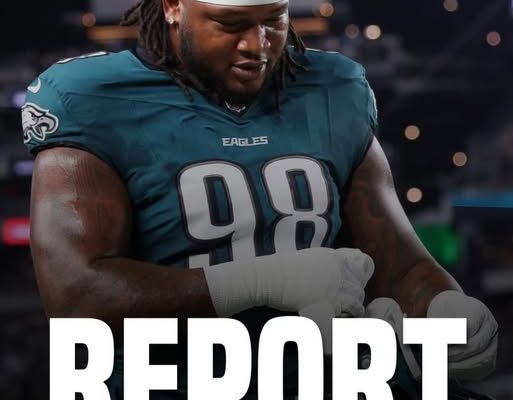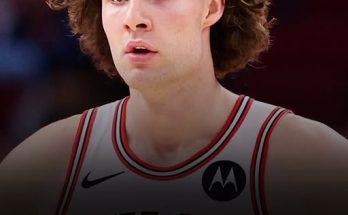The NFL has never been shy about enforcing discipline when it comes to protecting the image of the league, but the recent announcement surrounding Philadelphia Eagles defensive lineman Jalen Carter has sparked a storm of controversy, debate, and heated conversation among fans, analysts, and even fellow players. According to reports shared by NFL insider Adam Schefter, Carter has been fined $57,222 for spitting on Dallas Cowboys quarterback Dak Prescott during a heated rivalry game and, in addition, the league has announced that the contest from which he was ejected will count as a one-game suspension. The combination of these punishments has fans on both sides of the spectrum weighing in, questioning whether the discipline was too lenient, too harsh, or exactly what was needed in order to send a strong message.
The incident itself unfolded in the middle of what was already an emotionally charged game between the Eagles and Cowboys, two franchises whose rivalry is among the fiercest in all of professional football. The moment Carter crossed the line from intense physical play to disrespectful action, the narrative shifted from rivalry to sportsmanship. Cameras caught the act, social media immediately exploded, and by the time the final whistle blew, the discussion had already moved beyond football and into broader conversations about character, accountability, and how the league should handle such situations. In an era where the NFL is heavily scrutinized for everything from officiating to player conduct, a high-profile incident like this was never going to slide quietly into the background.
What has further fueled the conversation is the sheer nature of the act. Spitting on an opponent is widely considered one of the most disrespectful gestures in sports. It carries a personal weight far beyond a late hit, a taunting penalty, or even a scuffle. For Dak Prescott, a quarterback who has carried himself with professionalism and leadership throughout his career, being on the receiving end of such an act only heightened the outrage. Prescott has long been respected by both teammates and rivals for his demeanor, and many fans saw Carter’s actions as not just crossing a line but obliterating it. Meanwhile, Carter, a rising star with undeniable talent and potential, now finds himself at the center of a negative spotlight that overshadows his performance on the field.
The fine of $57,222 might seem arbitrary to casual fans, but to those who follow the league closely, it aligns with the NFL’s disciplinary structure. Still, fines at this level are not insignificant, even for players earning millions. They serve as both punishment and deterrent, signaling that the league views such behavior as unacceptable and damaging to its reputation. The suspension element complicates matters further. By declaring that the game from which Carter was ejected will also serve as his suspension, the NFL essentially closed the book on additional games missed, but not without leaving fans questioning whether the punishment fit the crime. Some argue that one game, especially given the severity of the action, wasn’t enough. Others believe that Carter already paid a price by being ejected and that the fine itself is more than sufficient.
This disciplinary action has sparked endless comparisons to past incidents across the NFL. Fans have pointed out other moments where players have been fined, suspended, or penalized for actions ranging from unsportsmanlike conduct to off-the-field missteps. Some recall moments when players received multiple games for far less visible actions, while others argue that the NFL has always placed more weight on intent and the message being sent to the public. In this case, spitting carries no ambiguity—it was intentional, disrespectful, and caught on camera. The league, in many ways, had no choice but to act swiftly and decisively.
Of course, the Philadelphia Eagles organization now finds itself in an awkward position. Jalen Carter is a cornerstone of their defensive line, a player whose talent and presence can change the course of games. Losing him for even a single contest is costly, but beyond the Xs and Os, the Eagles are forced to answer questions about discipline within the team. Coaches, front office executives, and even teammates have been asked to weigh in, with some defending Carter as a young player who made a mistake, while others stress the importance of accountability. Rivalries like Eagles-Cowboys are built on intensity, but the Eagles will undoubtedly face criticism if they don’t address the matter internally with seriousness.
On the other side, the Dallas Cowboys have every reason to be outraged, but Dak Prescott himself has largely remained composed. That is no surprise to anyone who knows his character, but it doesn’t lessen the sting of what happened. Fans in Dallas are already calling for harsher punishments, framing the incident as an attack on their leader and demanding that the NFL hold Carter to the highest possible standard. The Cowboys-Eagles rivalry doesn’t need any additional fuel, but this moment has guaranteed that the next meeting between the two teams will be under an even brighter spotlight.
Looking at the broader picture, this story is not just about Carter and Prescott but about the culture of the NFL itself. The league has been working tirelessly to balance entertainment, competition, and professionalism, and moments like this test those efforts. Players are role models whether they want to be or not, and in today’s digital age, every action is magnified. Spitting on an opponent isn’t just a bad look—it’s something kids, fans, and aspiring athletes see and talk about. The NFL knows that it must protect its image, and discipline is the only way to reinforce boundaries.
Yet, debates rage on about the consistency of NFL punishments. Fans often point to examples of star players seemingly receiving lighter treatment compared to others, or situations where off-field actions led to more severe penalties than anything that occurred between the lines. With Carter, some feel the punishment was calculated to balance accountability without derailing his season. After all, the league thrives when its stars are on the field, and Carter has quickly become one of the more recognizable young defensive talents in the game. The NFL’s decision here walks that fine line between discipline and pragmatism.
The fan reaction has been one of the most telling parts of this saga. Social media threads, comment sections, and sports talk shows are filled with passionate arguments. Some fans believe the punishment was spot on, citing the importance of fines and immediate ejections as deterrents. Others think Carter should have been suspended for multiple games to truly send a message. Still others argue that rivalry games can get heated, that emotions run high, and that perhaps the league is over-policing actions that used to be handled within the game itself. What’s undeniable is that everyone seems to have an opinion, and those opinions reveal just how invested fans are not just in the outcomes of games but in the character of the players they cheer for and against.
It’s also worth considering what this means for Jalen Carter moving forward. He is young, immensely talented, and still building his reputation. This incident could be a turning point in how he is perceived. If he learns from it, takes responsibility, and shows growth, it could eventually become a footnote in an otherwise stellar career. But if he fails to take it seriously, if incidents like this become a pattern, then it risks defining him. For now, he has an opportunity to address the situation directly, to apologize to Prescott, to his team, and to the fans who expect better. How he responds will be just as important as what the league has already decided.
The NFL season is long, and storylines come and go with dizzying speed. In a few weeks, this particular controversy may be overshadowed by another headline-grabbing moment. But for now, it lingers as a reflection of the passion, the intensity, and sometimes the volatility of professional football. It forces players, teams, and fans alike to grapple with questions of respect, accountability, and the fine line between competitive fire and unsportsmanlike conduct.
At the heart of all this is the reminder that the NFL is more than just a game—it is a cultural touchstone, watched by millions, dissected daily, and held to standards that sometimes feel impossible to meet. Jalen Carter’s actions, Dak Prescott’s response, and the league’s punishment together create a moment that will be remembered, debated, and revisited whenever conversations about discipline and respect arise.
Now, the conversation belongs to the fans. Do you believe the NFL got this one right, or do you think Carter should have faced harsher consequences? Was the fine and single-game suspension enough, or should the league have taken a stronger stance to set an example? And beyond the punishment itself, what does this say about where the line should be drawn between rivalry-driven emotion and professional sportsmanship? Share your thoughts, weigh in on the debate, and let your voice be heard. After all, football is about more than just what happens on the field—it’s about the conversations, the passion, and the perspectives of the fans who make the game what it is.



